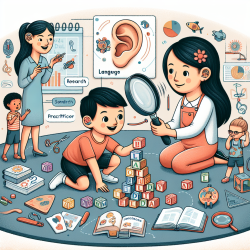Understanding the intricate relationship between health issues and language development in children is a vital aspect of supporting their educational journey, especially for those with special educational needs. One common health concern, Otitis Media (OM), or middle ear infection, has been a point of focus for researchers studying its potential impact on language acquisition and cognitive development. A significant study in this domain is "Otitis Media in Language Impaired and Normal Children" by Paula Tallal and Lee Allard, which provides valuable insights for practitioners looking to enhance their approach to supporting children with language impairments.
The study meticulously compares language-impaired (LI) and normally developing children, both with and without a history of chronic OM, across various domains including perceptual-motor, cognitive, linguistic, academic, and social-emotional performance. Surprisingly, the research reveals minimal significant differences between children with and without a history of chronic OM in both LI and normal groups. This outcome challenges the previously held assumption that OM plays a significant role in language disorders.
For special education practitioners, this study underscores the importance of a holistic approach when addressing language impairments in children. It suggests that while OM is a common childhood illness, its presence alone does not necessarily predispose children to language difficulties. This finding encourages educators and therapists to consider a broader range of factors when assessing and planning interventions for children with language delays or disorders.
Here are some practical ways practitioners can implement the outcomes of this research into their work:
- Comprehensive Assessment: Conduct thorough assessments that consider a child's entire developmental history and environmental factors, rather than focusing solely on medical history such as OM.
- Individualized Intervention Plans: Develop intervention plans based on the unique needs of each child, taking into account their strengths and weaknesses across various domains, rather than attributing language impairments to OM alone.
- Parent and Caregiver Education: Educate parents and caregivers on the multifaceted nature of language development and the limited impact of OM, encouraging a broader perspective on supporting their child's language skills.
- Continued Professional Development: Stay informed about the latest research in language development and disorders to refine assessment and intervention strategies, ensuring they are based on the most current understanding of the factors influencing language acquisition.
This study also highlights the necessity for further research to explore the complex interplay between medical conditions like OM and language development. Practitioners are encouraged to contribute to and stay abreast of ongoing research efforts, which could offer deeper insights into effective strategies for supporting children with language impairments.
In conclusion, "Otitis Media in Language Impaired and Normal Children" provides a compelling argument for a nuanced approach to understanding and addressing language development issues in children. By integrating these research findings into practice, special education practitioners can enhance their support for children with language impairments, ensuring interventions are tailored to the individual child's needs rather than based on assumptions about the role of medical conditions like OM.
To read the original research paper, please follow this link: Otitis Media in Language Impaired and Normal Children.










